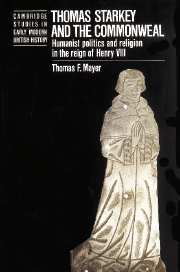Book contents
- Frontmatter
- Contents
- Acknowledgements
- A note on citations and abbreviations
- Introduction
- 1 Early life and education
- 2 Humanism from the source
- 3 ‘Occasyon and tyme wyl never be restorey agayne’: Pole, Paris and the Dialogue
- 4 A responsible aristocracy
- 5 The Dialogue in classical and ‘medieval’ tradition
- 6 An English spirituale
- 7 ‘Homo politicus et regalis’
- 8 Writing for the drawer
- Conclusion
- Bibliography
- Index
2 - Humanism from the source
Published online by Cambridge University Press: 03 November 2009
- Frontmatter
- Contents
- Acknowledgements
- A note on citations and abbreviations
- Introduction
- 1 Early life and education
- 2 Humanism from the source
- 3 ‘Occasyon and tyme wyl never be restorey agayne’: Pole, Paris and the Dialogue
- 4 A responsible aristocracy
- 5 The Dialogue in classical and ‘medieval’ tradition
- 6 An English spirituale
- 7 ‘Homo politicus et regalis’
- 8 Writing for the drawer
- Conclusion
- Bibliography
- Index
Summary
Thin evidence leaves us more dependent than usual on supposition to reconstruct Starkey's movements for much of the decade of the 1520s. Most previous claims about his activities cannot be supported – from the reasonably likely one that he lived in Pole's household in Padua through the more remote possibility that he served as Pole's chaplain to the ludicrous suggestion that he was set to spy on Pole. We have even fewer chronological landmarks than for Starkey's earlier life, as George Parks well summed up when he admitted that Starkey was in Padua, ‘though we do not know when he came or how long he stayed’. Nevertheless, a few new data about Starkey have turned up since Parks and W. Gordon Zeeveld wrote, together with much new evidence about the intellectual environment of Padua.
Placing Starkey into the proper context often remains difficult, but enough signposts exist to allow reasonable conjectures. Thus it seems likely enough that Starkey soon realized, like the boy in one of the vulgaria he may have translated as a youth, that he would have to go to Italy to complete his education and only a little less likely that he went there in company with Thomas Lupset in 1523. Again, it matters comparatively little where Starkey lived in Padua, but even if Starkey were not in Pole's employ, as old friends they would at least have known many of the same people.
- Type
- Chapter
- Information
- Thomas Starkey and the CommonwealthHumanist Politics and Religion in the Reign of Henry VIII, pp. 43 - 76Publisher: Cambridge University PressPrint publication year: 1989



